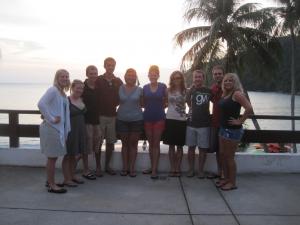by Karl Kerns, Iowa State University and Bethany Markway, Missouri State University
Leaving the beach this morning from Pangkor Island Beach Resort, the I-CAL team got back to the main land and headed to the first tour of the day, the Malayan Flour Mill. The flour mill was established in 1965, and was the first in Malaysia. We went on a tour of the plant and learned that it contains 70 silos with a total holding capacity of 65,000 tons raw product. The flour mill is located along the river and has its own port giving it multiple advantages over the competition. They receive shipments of wheat from Australia, Canada, and the United States in the amount of 30,000 tons at a time, taking a full week to unload. The flour mill produces 150 tons of flour per day. Numerous lab tests are conducted on the final product for great quality control. Proving its efficiency, the flour mill also operates a feed mill so that the byproducts can be put to good use.
The feed mill then supplies the company’s subsidiary poultry farms and other area farms. Their rations range from bullfrogs and marine life, to beef, poultry, and equine feeds. The mill doesn’t mix any swine feeds, as there are very few swine in the area. Our tour of the feed mill was very different than the one we experienced in Vietnam. We saw more modern machinery in conjunction with different safety and cleanliness standards. The mill produces some 16,000 metric tons per day and maintains an impressively low waste production rate. The plant also has its own quality control labs to test incoming raw products and outgoing finished product. It has active plans to expand its operating capacity of 20,000 metric tons per day as well as to expand its operation and production lines.
We are heading for Singapore in a few days. Overall, in Malaysia we can see an increase in the standard of living compared to Vietnam. The cost of living is still inexpensive when compared to the U.S.. For example, a iced coffee runs only about $0.50 USD. Tomorrow we look forward to starting out the day in the U.S. Grains Council’s Malaysia office, which will consist of a briefing on local agriculture by a U.S. Foreign Ag Service representative. Following that, we will meet with staff from the Malaysian Palm Oil Board (MPOB).


